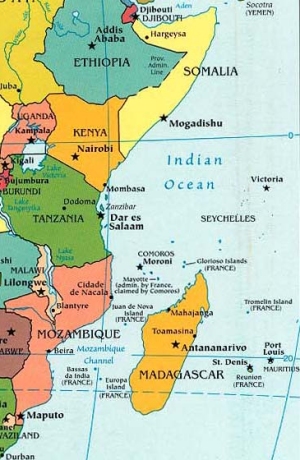Mar
14
More Natural Gas For the Glut
March 14, 2012 | Leave a Comment
Soon America won’t be alone with a glut of natural gas. Statoil, the Norwegian oil company, made big oil industry news late last month announcing it had found huge volumes of natural gas off the coast of Tanzania thus confirming east Africa’s reputation as one of the energy world’s most promising new frontiers.
The area off east Africa has yielded a series of huge discoveries over the past couple of years. Simon Ashby-Rudd, an oil investment banker at Standard Bank in the UK puts it this way, “With gas exploration you have to find an elephant field to make it worthwhile. They (oil exploration firms) didn’t just find one elephant – they found a herd of them.”
Mozambique and Tanzania, which until recently did not even feature on the world energy map, have become some of the gas industry’s hottest real estate.
The earlier players are Cove Energy, a small Africa-focused oil and gas explorer with an 8.5 per cent stake in a big gas field in Mozambique, Anadarko Petroleum and Eni of Italy. Their two fields combined could contain up to 60 trillion cubic feet (tcf) of recoverable resources of gas – nearly as much as Kuwait’s entire reserves.
The speculation is that should be enough to turn Mozambique into a key exporter of liquefied natural gas, or LNG, to China and India.
The region is still barely explored. Much more gas should turn up. The exploration group Afren says less than 500 wells have been drilled in all of east Africa, compared with some 20,000 in the north and nearly 15,000 in the west of the continent. Those areas are still turning out new reserves.
Claudio Descalzi, chief operating officer of Eni’s exploration and production division said its field discovery was “one of the most important we’ve had in our history, in terms of the quality of the reservoir, its dimensions and the markets it’s close to. It’s transformational for us.”
All this could be an economic transformation for Mozambique and Tanzania. The U.S. firm Anadarko is proposing a massive liquid natural gas plant in Mozambique estimated to cost about $25-billion (U.S.) – more than twice the country’s gross domestic product. The World Bank ranks Mozambique 204 out of 215 nations in terms of per capita income. That brings the question up about governance and if the wealth will affect everyone there fairly. It could turn one of the world’s poorest nations into one of the richest.
However, and this is a big one just to start – this is pirate territory. The Somali pirates already harass Statoil who has naval patrols guarding its drilling operations. African waters can be treacherous, Statoil has lockdown facilities on all its rigs and support vessels to keep staff safe in the event of a pirate attack, while a small flotilla of boats, operated by security contractors and Tanzanian navy personnel, guard the drilling site.
Now Eni, Anadarko and little Cove are firmly anchored in Mozambique. Statoil has a big find. Shell, Petrobras and Exxon Mobil are now setting up shop in Tanzania. Usually in these situations the leading little firms sell out for big payoffs to the majors who have the expertise, engineering staff and capital to get giant discoveries to market.
Liquefaction of natural gas doesn’t come cheap. It’s a multibillion dollar exercise for each facility and billions more to find and pipe in the gas as well as load it out for shipping.
Anadarko, one of the best dealmakers in the oil business has already announced it is looking to sell some of its stake in the Mozambique field. Little Cove simply put itself up for sale in January.
The independent oil firms are not standing around, the pace of drilling is picking up. Morgan Stanley expects 23 wells to be drilled off Kenya, Tanzania and Mozambique this year, almost double the number in 2011.
Its enough to make the folks around the American Gulf of Mexico coast quite disappointed and piqued at the U.S. federal government for letting the business get away.
Still, this will be a blessing for crude oil prices over time. There’s a lot more market penetration for compressed natural gas (CNG) in Asia than the U.S. Every vehicle that’s built or converts to CNG fuel is one less using oil.
Now if the local folks can get the governance right and not start another messy war this could look very good for the world’s energy markets.


